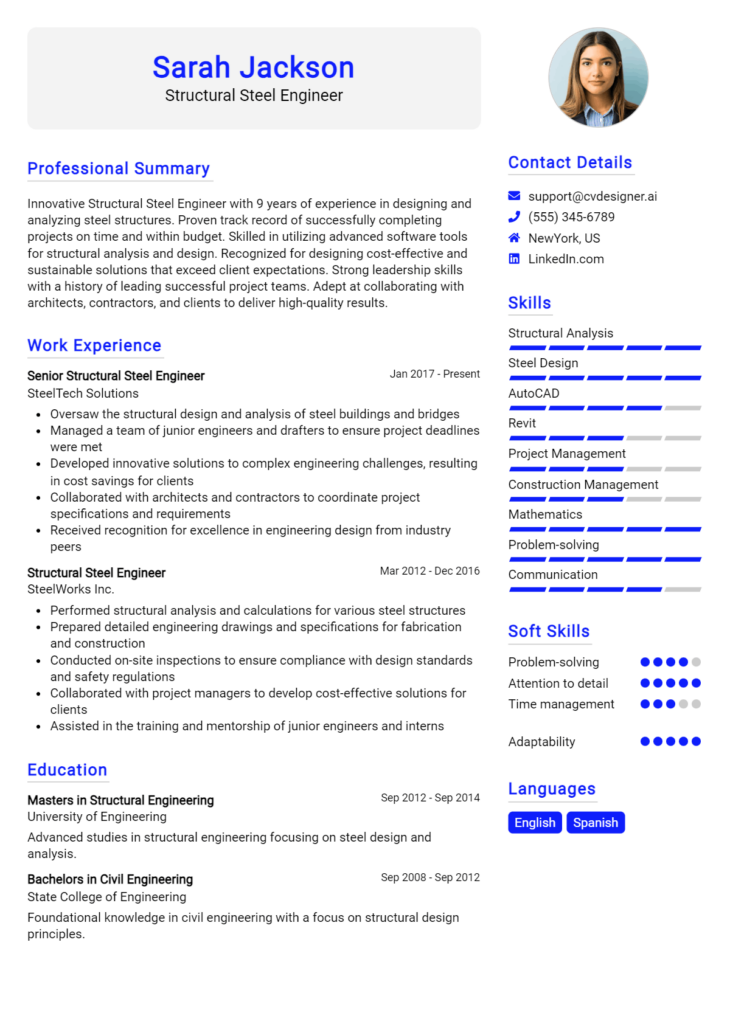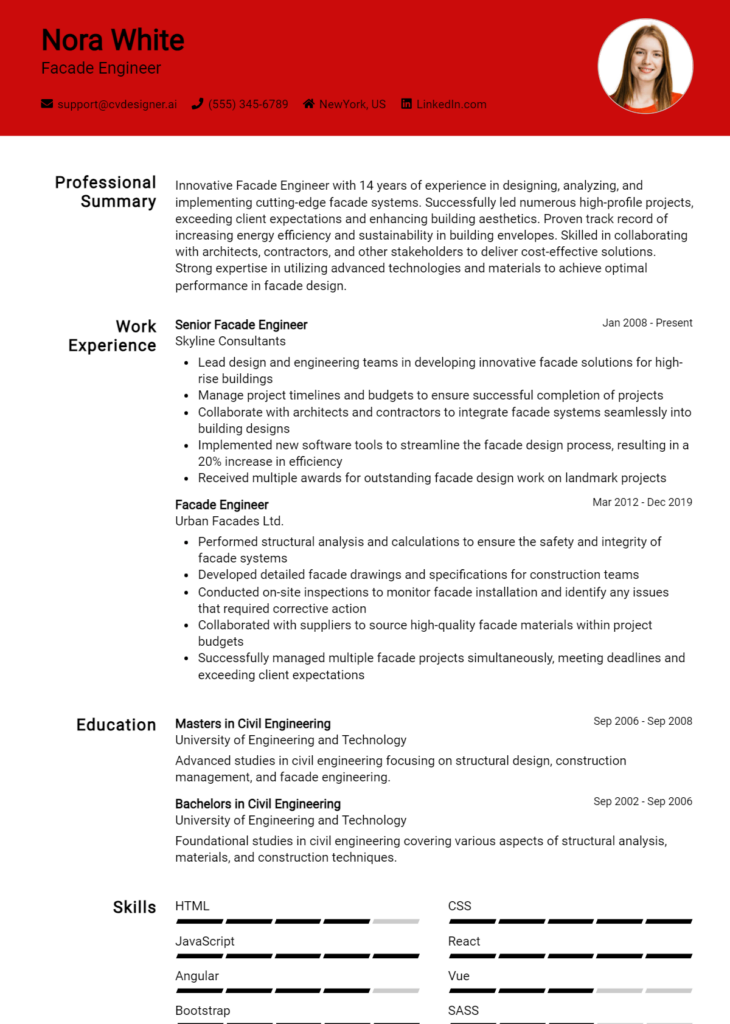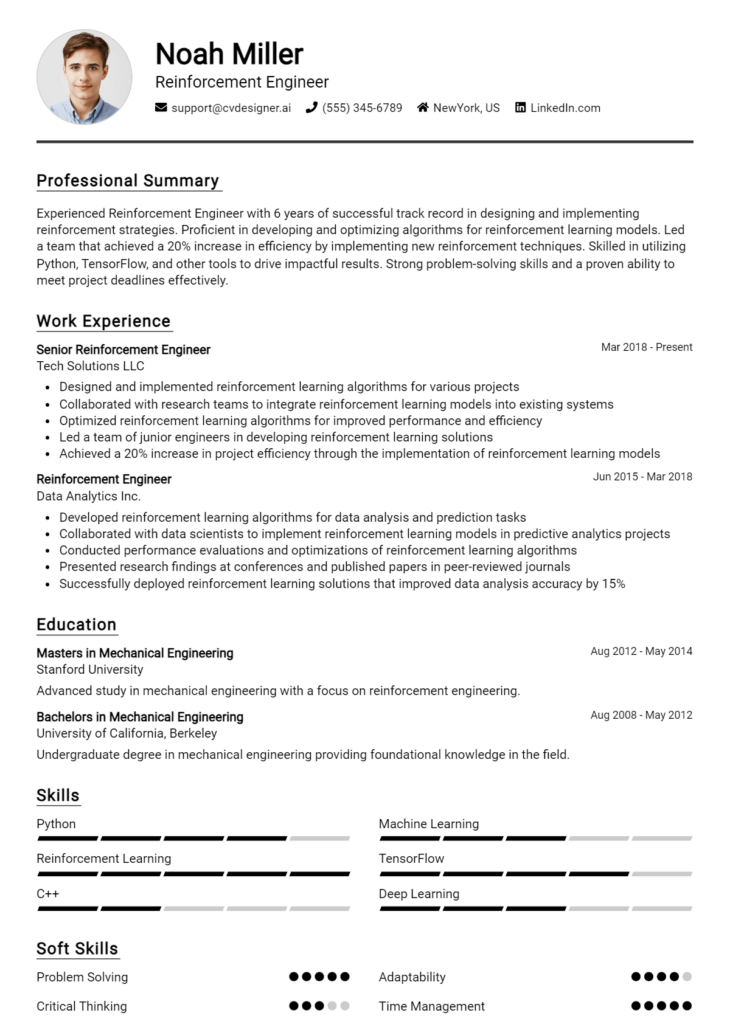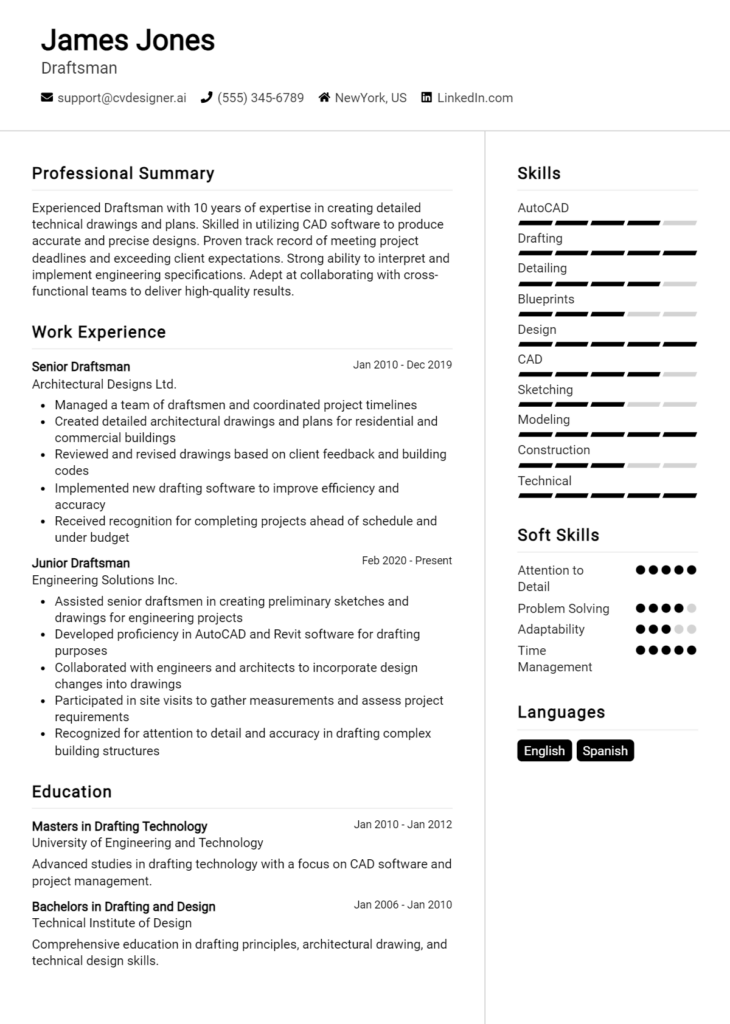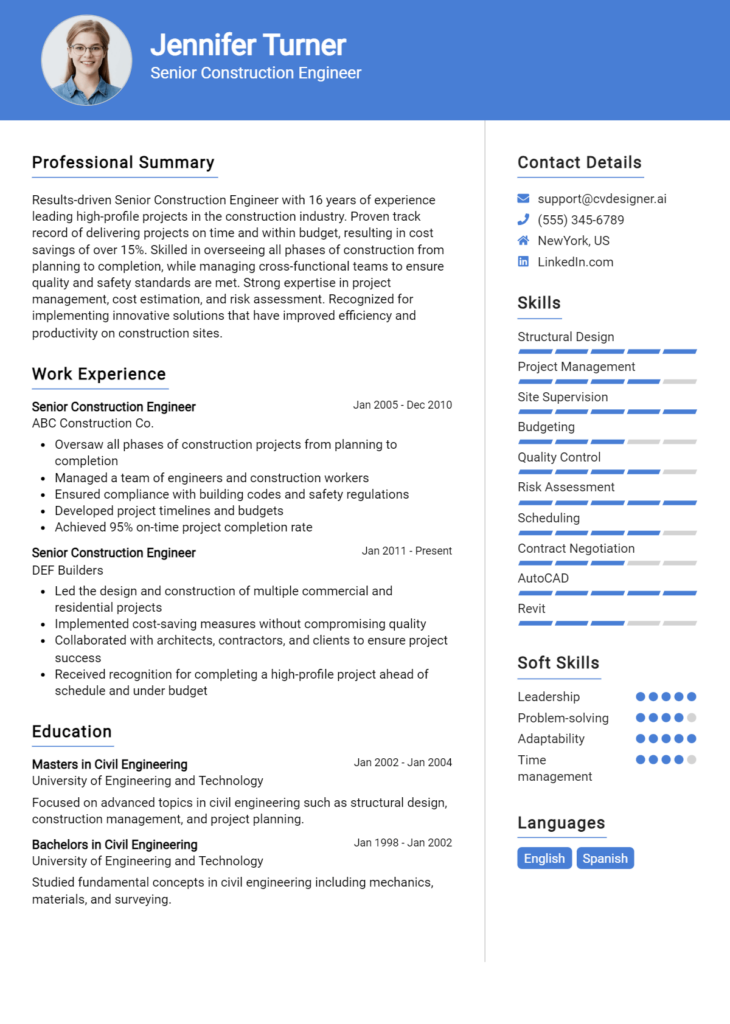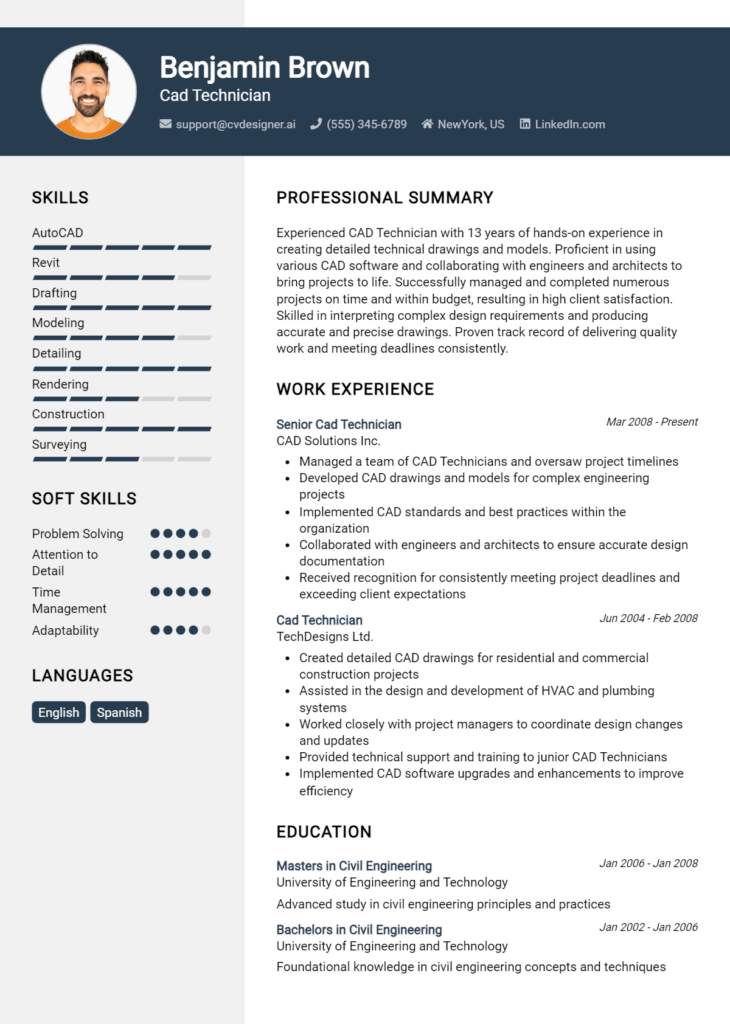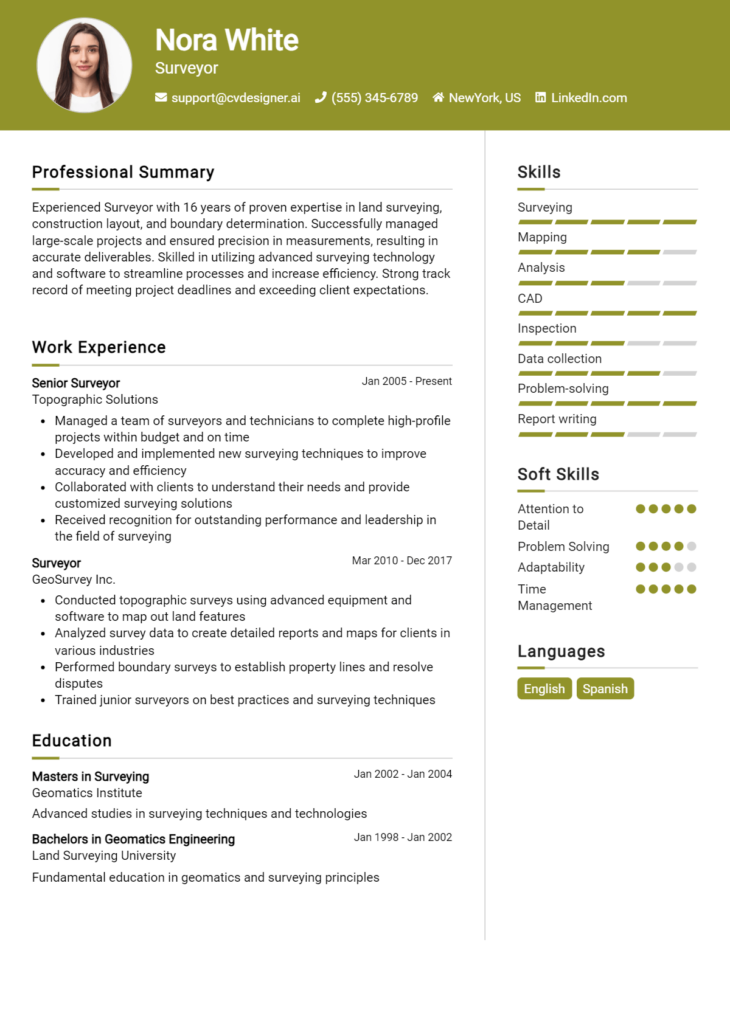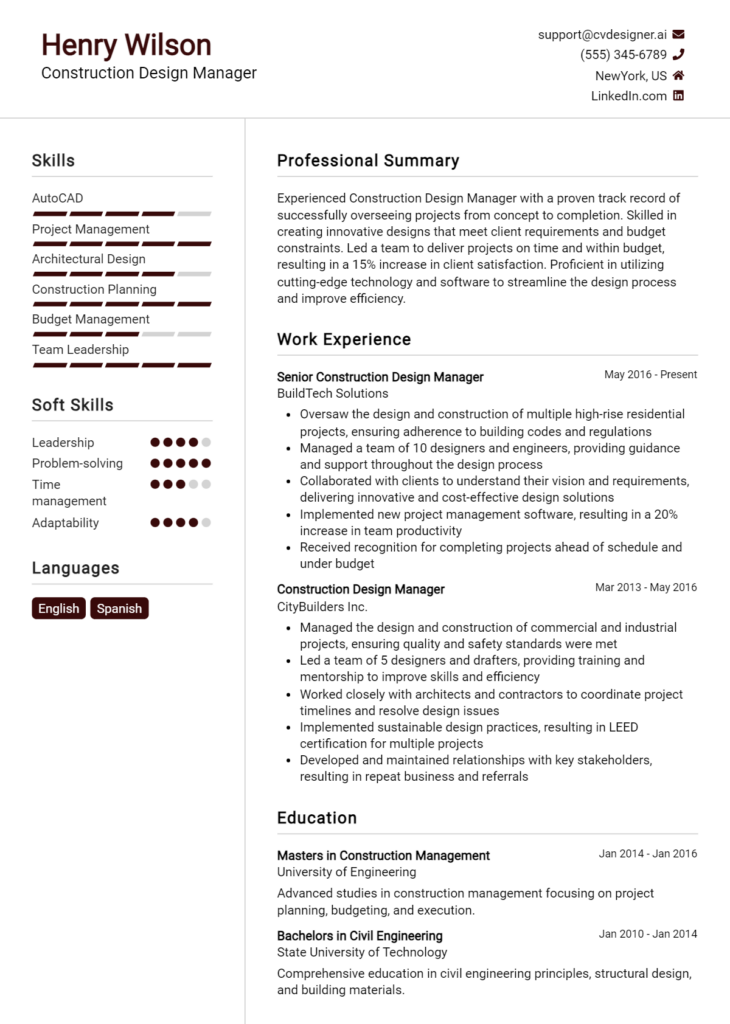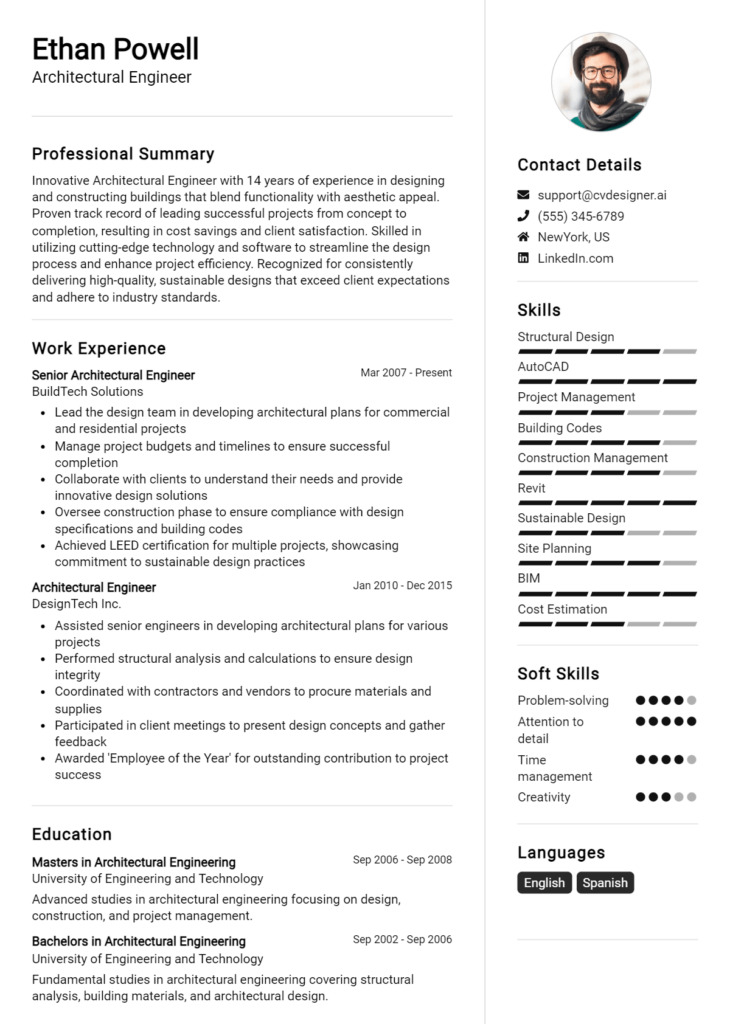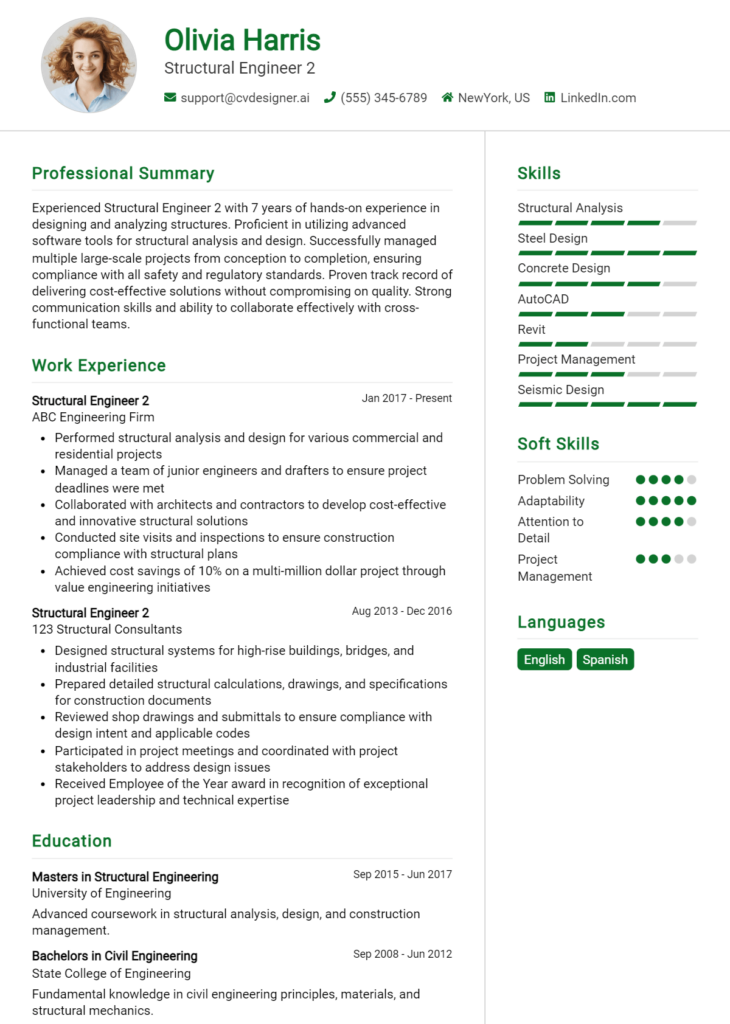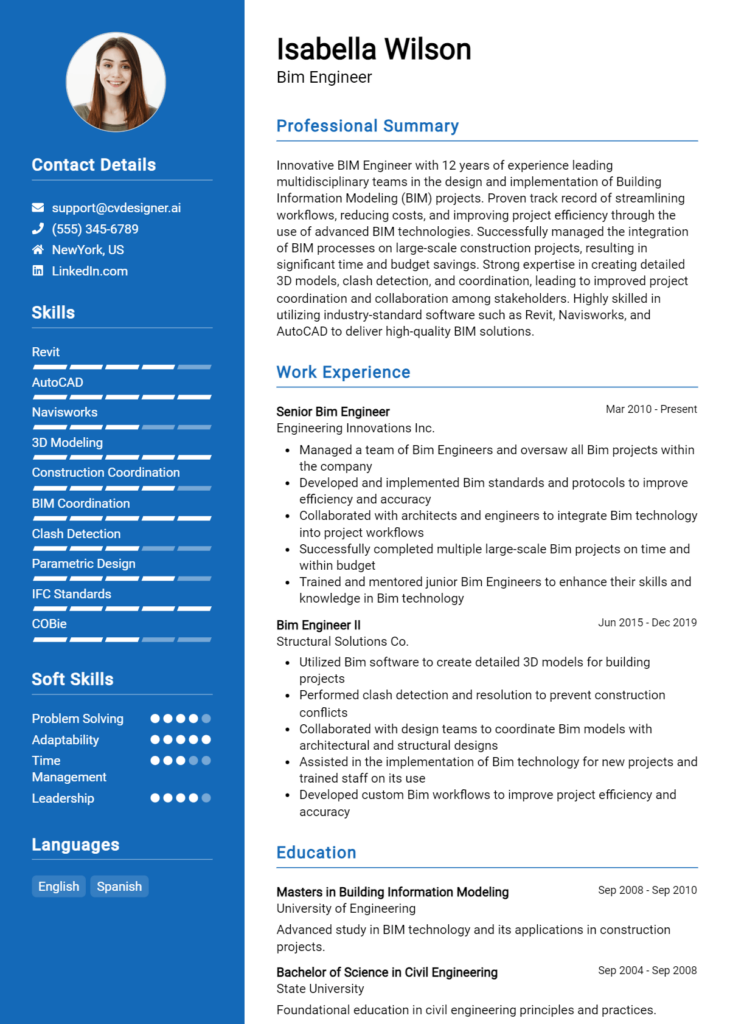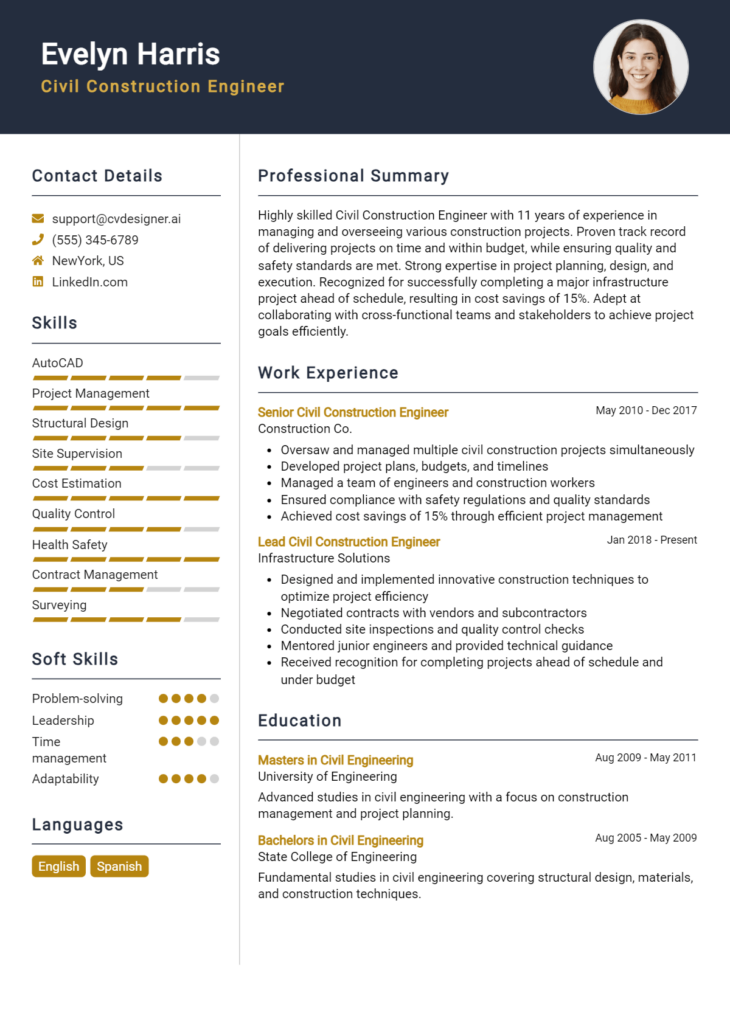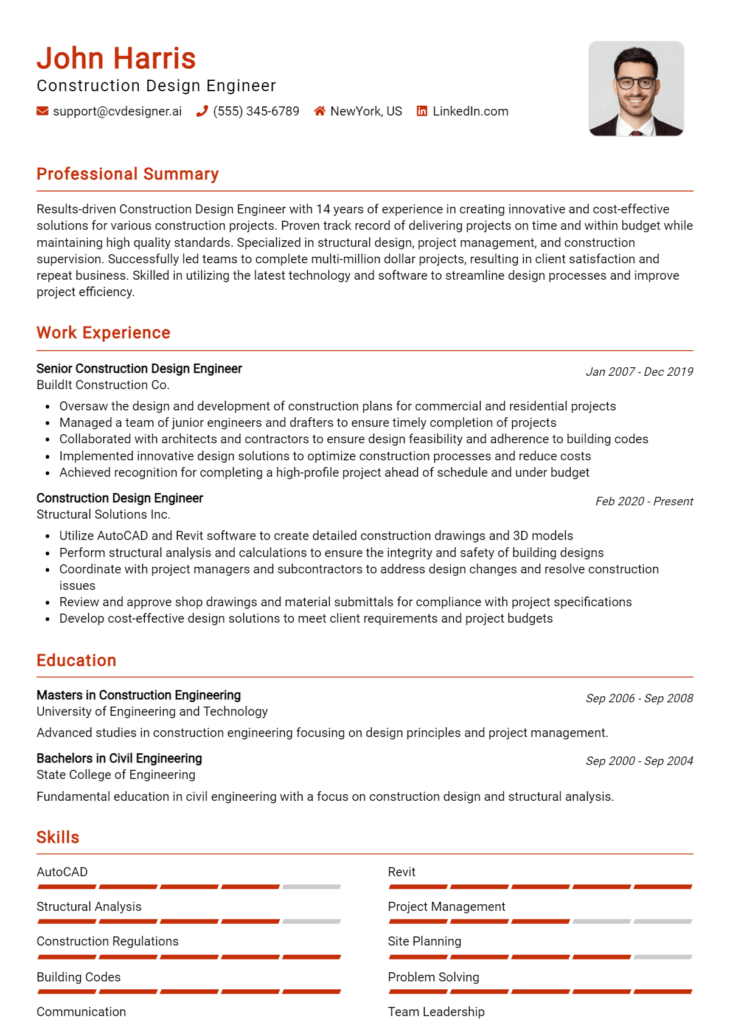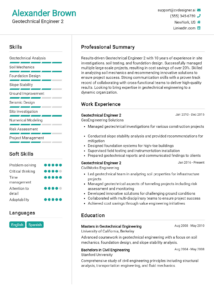
Geotechnical Engineer Core Responsibilities
A Geotechnical Engineer plays a crucial role in assessing soil and rock properties to inform construction and environmental projects. Key responsibilities include conducting site investigations, analyzing geotechnical data, and designing foundations. This position requires strong technical, operational, and problem-solving skills, as it bridges various departments such as civil engineering, environmental science, and construction management. A well-structured resume that highlights these competencies can effectively demonstrate an engineer's ability to contribute to an organization’s goals through innovative and sustainable design solutions.
Common Responsibilities Listed on Geotechnical Engineer Resume
- Conduct site investigations and soil testing.
- Analyze geotechnical data and prepare reports.
- Design foundations and retaining structures.
- Evaluate slope stability and earth pressure.
- Collaborate with civil engineers and project managers.
- Provide recommendations for construction methods.
- Monitor construction activities for compliance.
- Develop and implement geotechnical design standards.
- Perform risk assessments related to soil and rock conditions.
- Prepare feasibility studies for engineering projects.
- Utilize software for geotechnical modeling and analysis.
High-Level Resume Tips for Geotechnical Engineer Professionals
In the competitive field of geotechnical engineering, a well-crafted resume is crucial for making a strong first impression on potential employers. Your resume serves as a marketing tool that showcases your skills, achievements, and professional experience, highlighting your qualifications in a way that resonates with hiring managers. Given the technical nature of the profession, it's essential to present your expertise clearly and effectively. This guide will provide practical and actionable resume tips specifically tailored for geotechnical engineer professionals, ensuring that your application stands out in a crowded job market.
Top Resume Tips for Geotechnical Engineer Professionals
- Tailor your resume to the job description by using relevant keywords and phrases that align with the specific requirements of the position.
- Highlight your technical skills, such as proficiency in geotechnical software (e.g., PLAXIS, GeoStudio) and understanding of soil mechanics.
- Showcase your relevant experience by detailing projects you've worked on, including your role and contributions to each project.
- Quantify your achievements by including metrics, such as the percentage of cost savings or reductions in project timelines you achieved.
- Include certifications and licenses relevant to geotechnical engineering, such as Professional Engineer (PE) or certifications from recognized geotechnical organizations.
- Use action verbs to describe your accomplishments, such as "designed," "implemented," or "analyzed," to convey a sense of proactivity and impact.
- Organize your resume with clear headings and sections, making it easy for hiring managers to navigate and find key information quickly.
- Incorporate soft skills, such as teamwork, communication, and problem-solving, which are vital in collaborative engineering environments.
- Consider including a brief summary or objective statement at the top of your resume that encapsulates your career goals and what you bring to the table.
By implementing these tips, you can significantly increase your chances of landing a job in the geotechnical engineering field. A well-structured and targeted resume not only highlights your qualifications but also demonstrates your commitment to the profession, making you a more attractive candidate to potential employers.
Why Resume Headlines & Titles are Important for Geotechnical Engineer
In the competitive field of geotechnical engineering, a well-crafted resume headline or title is crucial for standing out among numerous applicants. A strong headline not only captures the attention of hiring managers but also succinctly summarizes a candidate's key qualifications in one impactful phrase. This brief yet powerful statement should be concise, relevant, and directly aligned with the job being applied for, making it easier for employers to quickly assess the candidate's suitability for the position.
Best Practices for Crafting Resume Headlines for Geotechnical Engineer
- Keep it concise: Aim for a headline that is no longer than a single sentence.
- Be role-specific: Tailor the headline to reflect the specific geotechnical engineering role you are applying for.
- Highlight key skills: Include essential skills or qualifications relevant to the job description.
- Use strong action words: Choose impactful verbs that convey your expertise and experience.
- Incorporate metrics or achievements: If possible, quantify accomplishments to demonstrate effectiveness.
- Focus on value: Emphasize what you can bring to the company and how you can contribute to their projects.
- Avoid jargon: Make sure the language is clear and accessible to hiring managers who may not be specialists in the field.
- Revise and refine: Edit the headline to ensure it aligns with the overall tone and focus of your resume.
Example Resume Headlines for Geotechnical Engineer
Strong Resume Headlines
Dynamic Geotechnical Engineer with 8+ Years of Experience in Soil Mechanics and Foundation Design
Results-Driven Geotechnical Specialist with Proven Expertise in Ground Improvement Techniques and Project Management
Certified Geotechnical Engineer Skilled in Geotechnical Investigations and Risk Assessment
Weak Resume Headlines
Engineer Looking for a Job
Experienced Professional in Engineering
The strong headlines are effective because they are specific, highlight relevant skills, and convey a sense of accomplishment, immediately showcasing the candidate's strengths to the hiring manager. In contrast, the weak headlines fail to impress due to their vagueness and lack of relevant detail, making it difficult for employers to assess the candidate's qualifications and suitability for the position in a crowded job market.
Writing an Exceptional Geotechnical Engineer Resume Summary
A well-crafted resume summary is crucial for a Geotechnical Engineer, as it serves as the first impression for hiring managers. A strong summary effectively highlights key skills, relevant experience, and notable accomplishments, allowing candidates to stand out in a competitive job market. By summarizing their expertise in a concise and impactful manner, applicants can quickly capture the attention of hiring managers and demonstrate their suitability for the role. Tailoring the summary to align with the specific job description further enhances its effectiveness, making it an essential element of a successful resume.
Best Practices for Writing a Geotechnical Engineer Resume Summary
- Quantify achievements to demonstrate impact (e.g., "Reduced project costs by 20%").
- Focus on relevant skills that align with the job description.
- Tailor the summary for each specific job application.
- Use industry-specific terminology to showcase expertise.
- Highlight certifications and technical skills that are pertinent to the role.
- Keep it concise—ideally 2-4 sentences long.
- Showcase leadership or project management experience when applicable.
- Include any notable projects or innovations that differentiate you from other candidates.
Example Geotechnical Engineer Resume Summaries
Strong Resume Summaries
Results-driven Geotechnical Engineer with over 8 years of experience in soil analysis and foundation design, successfully completing projects with budgets exceeding $5 million. Proven ability to reduce project timelines by 15% through effective risk management and innovative design solutions.
Detail-oriented Geotechnical Engineer specializing in slope stability and site characterization, with a track record of enhancing project efficiency by implementing advanced geotechnical techniques. Recognized for leading a team that improved soil stabilization methods, resulting in a 30% increase in project success rates.
Dynamic Geotechnical Engineer with expertise in geotechnical investigations and environmental assessments. Successfully managed multiple large-scale projects, achieving a 25% reduction in costs through strategic planning and stakeholder collaboration.
Weak Resume Summaries
Experienced engineer with a background in geotechnical work looking for a new opportunity.
Geotechnical Engineer with some skills in project management and soil analysis. Ready to take on new challenges.
The strong resume summaries are considered effective because they include specific achievements, quantify results, and demonstrate a clear alignment with the skills and experiences that hiring managers are seeking. In contrast, the weak summaries are vague, lack measurable outcomes, and fail to showcase the candidate's unique qualifications, making them less compelling to potential employers.
Work Experience Section for Geotechnical Engineer Resume
The work experience section of a Geotechnical Engineer resume is vital in demonstrating a candidate's practical expertise in the field. This section not only highlights the candidate's technical skills but also showcases their ability to manage teams and deliver high-quality engineering solutions. By quantifying achievements and aligning their experience with industry standards, candidates can effectively illustrate their contributions to previous projects, making a compelling case for their qualifications in the competitive job market.
Best Practices for Geotechnical Engineer Work Experience
- Clearly outline your role in specific projects, emphasizing your technical contributions and responsibilities.
- Use quantifiable results to demonstrate the impact of your work, such as cost savings, improved safety metrics, or project completion times.
- Highlight collaboration with multidisciplinary teams, showcasing your communication and leadership skills.
- Include relevant software and tools you are proficient in, illustrating your technical capability.
- Tailor your experience to match the requirements of the job you are applying for, using industry-specific terminology.
- Showcase continuous professional development, such as certifications or specialized training relevant to geotechnical engineering.
- Provide context for your achievements, explaining the challenges faced and how you overcame them.
- Keep descriptions concise, focusing on the most relevant experiences and outcomes that align with the desired job role.
Example Work Experiences for Geotechnical Engineer
Strong Experiences
- Led a team in the design and implementation of a $3 million soil stabilization project, resulting in a 25% reduction in settlement issues and improved structural integrity.
- Conducted geotechnical investigations for a high-rise building, successfully identifying and mitigating risks, which contributed to the project completing three months ahead of schedule.
- Implemented a new data analysis protocol that improved the accuracy of subsurface assessments, increasing project efficiency by 30% and reducing costs by 15%.
- Collaborated with civil engineers and environmental scientists on a major infrastructure project, ensuring compliance with all regulatory standards while achieving an 80% stakeholder satisfaction rate.
Weak Experiences
- Worked on various engineering projects.
- Assisted in geotechnical investigations.
- Responsible for some data analysis tasks.
- Participated in team meetings and discussions.
The examples listed as strong experiences are characterized by specific, quantifiable outcomes that illustrate the candidate's technical expertise and leadership in their field. They focus on measurable achievements and collaboration, making them compelling. In contrast, the weak experiences lack detail, specificity, and quantifiable results, which fail to convey the candidate's true capabilities or impact, making them less impressive to potential employers.
Education and Certifications Section for Geotechnical Engineer Resume
The education and certifications section of a Geotechnical Engineer resume is crucial as it showcases the candidate's academic foundation and commitment to professional growth. This section highlights not only the degrees obtained but also any industry-relevant certifications and specialized training that reflect a dedication to continuous learning and adherence to industry standards. By providing details about relevant coursework and certifications, candidates can significantly enhance their credibility and demonstrate their alignment with the requirements of the job role, making them more appealing to potential employers.
Best Practices for Geotechnical Engineer Education and Certifications
- Include your highest degree first, followed by relevant certifications.
- Highlight advanced degrees (e.g., Master's or PhD) if applicable, particularly in Geotechnical Engineering or related fields.
- List industry-recognized certifications, such as Professional Engineer (PE) or Geotechnical Engineering certification.
- Provide details about relevant coursework that pertains to geotechnical principles, soil mechanics, or foundation engineering.
- Update your certifications to reflect current standards and practices; avoid listing outdated credentials.
- Consider including specialized training or workshops that demonstrate advanced skills or knowledge in emerging technologies.
- Make sure to format this section clearly and concisely for easy reading and quick reference.
- Tailor the content to the specific job application, emphasizing the most relevant qualifications for each position.
Example Education and Certifications for Geotechnical Engineer
Strong Examples
- M.S. in Geotechnical Engineering, University of California, Berkeley, 2021
- Professional Engineer (PE) License, State of California, 2022
- Geotechnical Engineering Certification, American Society of Civil Engineers (ASCE), 2023
- Relevant Coursework: Soil Mechanics, Foundation Engineering, Earth Retention Systems
Weak Examples
- Bachelor's Degree in English Literature, University of Texas, 2018
- Basic First Aid Certification, 2020
- Certified Public Accountant (CPA), 2019
- Course on General Business Management, 2021
The examples provided are considered strong because they are directly relevant to the field of Geotechnical Engineering, showcasing advanced degrees, recognized certifications, and pertinent coursework that align well with industry expectations. In contrast, the weak examples demonstrate a lack of relevance to the geotechnical field, with degrees and certifications that do not contribute to the candidate's qualifications as a Geotechnical Engineer, making them less appealing to potential employers.
Top Skills & Keywords for Geotechnical Engineer Resume
A well-crafted resume for a Geotechnical Engineer is crucial in showcasing an applicant's qualifications and expertise in the field. In this competitive job market, the importance of highlighting relevant skills cannot be overstated. Skills serve as a bridge between your experience and the specific requirements of the job, providing hiring managers with a clear understanding of your capabilities. A strong emphasis on both hard and soft skills not only demonstrates technical proficiency but also reflects your ability to collaborate effectively in a team environment, manage projects, and communicate complex information clearly. This balance is essential for success in geotechnical engineering, where both analytical and interpersonal skills are vital.
Top Hard & Soft Skills for Geotechnical Engineer
Soft Skills
- Strong analytical thinking
- Effective communication
- Team collaboration
- Problem-solving ability
- Time management
- Adaptability
- Attention to detail
- Project management
- Leadership qualities
- Critical thinking
Hard Skills
- Soil mechanics expertise
- Geotechnical site investigations
- Foundation design
- Slope stability analysis
- Geosynthetics application
- Ground improvement techniques
- Computer-aided design (CAD)
- Geotechnical modeling software proficiency
- Environmental regulations knowledge
- Risk assessment and management
For those looking to refine their skills and present a strong work experience section, incorporating these key competencies into your resume can greatly enhance your chances of landing an interview in the geotechnical engineering field.
Stand Out with a Winning Geotechnical Engineer Cover Letter
Dear [Hiring Manager's Name],
I am writing to express my interest in the Geotechnical Engineer position at [Company Name], as advertised on [Where You Found the Job Posting]. With a Master’s degree in Geotechnical Engineering from [Your University] and over [X years] of hands-on experience in soil analysis, foundation design, and site investigations, I am excited about the opportunity to contribute to your team. My background has equipped me with the necessary skills to tackle complex geotechnical challenges and ensure the successful execution of projects.
In my previous role at [Previous Company Name], I led a variety of projects where I conducted comprehensive soil assessments and utilized advanced geotechnical software to evaluate site conditions. My ability to interpret geological data and design effective foundation solutions has resulted in significant cost savings and improved project timelines. Furthermore, I have collaborated closely with multidisciplinary teams, ensuring that geotechnical considerations are integrated into overall project planning and execution. This experience has honed my communication skills and my ability to work effectively under pressure.
I am particularly drawn to [Company Name] due to its commitment to innovative engineering solutions and sustainable practices. I admire your recent project on [Specific Project or Initiative] and would love the opportunity to bring my expertise in geotechnical investigations and design to your team. I am confident that my proactive approach and dedication to maintaining high safety standards will add value to your ongoing projects.
Thank you for considering my application. I am looking forward to the opportunity to discuss how my skills and experiences align with the needs of your team. I am eager to contribute to the success of [Company Name] and to further my career within such a reputable organization.
Sincerely,
[Your Name]
[Your Phone Number]
[Your Email Address]
Common Mistakes to Avoid in a Geotechnical Engineer Resume
When crafting a resume as a Geotechnical Engineer, it’s crucial to present your skills and experiences in a clear and professional manner. However, many candidates make common mistakes that can hinder their chances of standing out in a competitive job market. Understanding these pitfalls can help you create a more effective resume that showcases your qualifications and expertise. Here are some common mistakes to avoid:
Neglecting Keywords: Failing to include industry-specific keywords can make your resume less likely to pass through applicant tracking systems, which often filter resumes based on relevant terminology.
Overloading with Technical Jargon: While it’s important to demonstrate technical knowledge, using excessive jargon can alienate hiring managers who may not be familiar with all the terms. Strive for clarity.
Lack of Quantifiable Achievements: Simply listing job duties without quantifiable results can weaken your resume. Use metrics to illustrate your impact, such as improved soil stability percentages or successful project completions.
Ignoring Formatting Consistency: Inconsistent formatting, such as varying font sizes or styles, can make your resume look unprofessional. Ensure uniformity in headings, bullet points, and spacing throughout.
Omitting Relevant Certifications: Certifications like Professional Engineer (PE) or other relevant licenses are crucial in this field. Be sure to prominently feature these credentials to highlight your qualifications.
Too Much Focus on Soft Skills: While soft skills are important, geotechnical engineering is a highly technical field. Balance your soft skills with technical expertise to show you are well-rounded.
Using a Generic Objective Statement: A vague objective statement can make your resume blend in with others. Customize your objective to reflect your specific career goals and how they align with the position you are applying for.
Failing to Tailor the Resume for Each Job Application: Sending out the same resume for every position can be detrimental. Tailor your resume to emphasize the experiences and skills that are most relevant to each job description.

